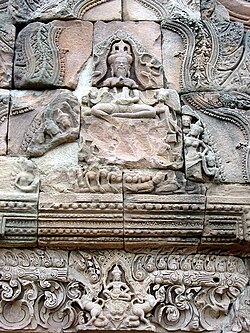Philosophy:Yogeshvara
From HandWiki
Short description: Hindu epithet
Yogeshvara (Sanskrit: योगेश्वर, romanized: Yogeśvara, lit. 'Lord of Yoga') is a Sanskrit epithet employed in Hinduism.[1] The term Yogeshvara is a portmanteau of yoga and ishvara, meaning 'Lord of Yoga', 'Lord of Yogis', or 'God of Yoga'. The term is primarily employed to address the deities Shiva and Krishna.[2][3][4]
Hinduism
The term is an epithet of Krishna in Vaishnavism, who is also known as Parameshvara, the supreme god.[5][6][7]
Yogeshvara is a main deity in the Swadhyaya Movement, along with Shiva, Ganesha, and Parvati.
References
- ↑ www.wisdomlib.org (2017-09-21). "Yogeshvara, Yogeśvara, Yoga-ishvara: 19 definitions" (in en). https://www.wisdomlib.org/definition/yogeshvara.
- ↑ T.N. Sethumadhavan (26 March 2015). Srimad Bhagavad Gita: A User'S Manual for Every Day Living. Partridge Publishing. p. 339. ISBN 978-1482846096. https://books.google.com/books?id=LdLBBwAAQBAJ.
- ↑ Swami Sivananda (1964). Sri Krishna. Bharatiya Vidya Bhavan. p. 4. https://books.google.com/books?id=oKiGPRGChjYC.
- ↑ "Krishna the Yogeshwara". The Hindu. 12 September 2014. https://www.thehindu.com/features/friday-review/religion/religious-discourse-krishna-the-yogeshwara/article6405504.ece.
- ↑ T.N. Sethumadhavan (26 March 2015). Srimad Bhagavad Gita: A User'S Manual for Every Day Living. Partridge Publishing. p. 339. ISBN 978-1482846096. https://books.google.com/books?id=LdLBBwAAQBAJ.
- ↑ Swami Sivananda (1964). Sri Krishna. Bharatiya Vidya Bhavan. p. 4. https://books.google.com/books?id=oKiGPRGChjYC.
- ↑ "Krishna the Yogeshwara". The Hindu. 12 September 2014. https://www.thehindu.com/features/friday-review/religion/religious-discourse-krishna-the-yogeshwara/article6405504.ece.
 |



